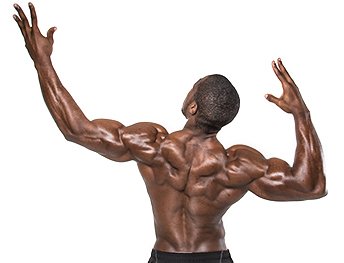I'm no stranger to body transformations. Having been a both fitness coach and the co-founder of Fitocracy, I've been exposed to countless successful transformations, but even more stories of people who've started, continued, and ended their fitness journey. Unfortunately, despite all the inspiring and triumphant stories out there, most people are still failing at reaching their fitness goals—and obesity rates continue rising.
How can that be? The two reason I hear people cite the most are, "If I just had the motivation," and "If I only had the willpower." They seem to think there's a secret to making a successful fitness transformation—like motivation and will-power are some sort of magic pixie dust that makes fit people instantly hate the taste of pizza and love the treadmill.
You know who has motivation? Your average Joe who joins a gym in January. He's motivated as hell. Sadly, neither he nor his motivation stick around until March rolls around. He stops going to the gym, feels guilty, and then blames his lack of willpower.
Let me say it once and for all: Fitness success is not merely about motivation! Motivation is fleeting and unreliable. Rather, fitness is a skill, like riding a bike or learning a language. Here's how you can cultivate the skill and make it work for you.
The Growth and Fixed Mindset
Psychologist Carol Dweck has a great theory which places people on a continuum comprised of two different fundamental mindsets: "fixed" and "growth." Her theory wasn't necessarily created with fitness in mind, but I believe it goes right to the heart of what makes us succeed or fail in our physical goals.

Those with fixed mindsets believe that success is based on innate talent. In other words, someone is born with certain characteristics, and you either have them or you don't. Failures—such as the failure to follow a diet—are the result of lacking these characteristics, such as self-control, discipline, or intelligence.
By contrast, those with a growth mindset believe that success relies upon improving their different skill sets through hard work, learning, and experience. These people believe they can improve their success in different facets of life. I happen to agree.
Back to my original bike-riding analogy: The growth mindset is analogous to falling off the bike on your first attempt at riding, but being willing to get back on and try again. You understand that you didn't fall because you lack the necessary discipline to ride your bike. You just know your skill isn't fully developed yet, so you keep practicing until it is.
For millions of people, all things involved with fitness seem to fall squarely in the realm of the fixed mindset. When they slip up on their diets, they tend to scold themselves for being undisciplined and lazy, rather than stopping to think about why they slipped up and how they can avoid it in the future. People with a fixed mindset try to force their success with sheer willpower, which simply doesn't work.
Studies have shown that willpower is a finite resource. Thus, relying on it alone is less likely to lead to success. If fitness is a skill, which I believe is the case, then it should be improved by working the muscles of other skills that constitute a successfully fit life. Embrace these five skills of fitness, and you'll be on the road to a lasting change.
1
Knowledge
Knowledge is an evidence-based understanding of things like training and nutrition. It allows you to create a plan and execute it. Knowledge can be either basic—understanding calories and how they impact your weight—or relatively advanced, such as correctly incorporating a carbohydrate re-feed in order to raise leptin during your diet. You can improve your knowledge by reading sites like this one, or by utilizing credible fitness pros like Alan Aragon and Layne Norton for their encyclopedic knowledge.

Knowledge is the most important of all skills, but paradoxically, it is also the most abused. That's because more fitness and nutrition information is swirling around the Internet than ever. Everyone can be a citizen scientist or guru, it seems. Easy access to abundant resources like PubMed often leads to misinterpreted or romanticized readings of information.
Too much information, especially if you can't sift through all the white noise, can put you at a disadvantage. After all, what good will understanding the optimal meal timing to optimize muscle protein synthesis do for you if you can't stop yourself from binge eating?
That's where mindfulness comes into play.
2
Mindfulness
Mindfulness is the examination of your feelings, surroundings, and your existence relative to everything else. Think of mindfulness as fitness wisdom. It's the ability to learn about yourself and your feelings. Without it, you wouldn't be able to learn from your mistakes.
I recently had the following conversation with a client:
As you can see, the client saw a binge as a failure without any underlying context. He was actually confused by the idea that he could dig deeper into his binge beyond simple failure. This is a case where people approach fitness with a markedly different eye than they do, say, business.

In business, people may seek out patterns to preclude the chance of repeating a mistake, but this doesn't seem to be the case in fitness. It's as if fitness is an all-or-nothing principle.
By practicing mindfulness, the client eventually broke down his binge into independent events and traced them to conscious decisions. We agreed that going 50 calories over maintenance is hardly a disaster. The next time this client sees this same pattern, he can use previous experiences to disrupt this course of action.
You can improve mindfulness by following the "totem exercise" that I write about here.
3
Self-Compassion
Hate. Guilt. Self-loathing. These are the typical feelings of someone who slips up on an otherwise "perfect" day. For many, cycles of perceived dieting failures have perpetuated a lifetime of these feelings. They become convinced that they need to "strengthen their resolve" to overcome these weight-loss hurdles. And each time, they face the same disastrous outcome.
Research has shown that developing self-compassion allows people to think of fitness more as a skill to improve, rather than an end goal. Those who show self-compassion forgive themselves for their mistakes so that they can try again with a more productive mindset.
The next time you mess up, cut yourself some slack! Then exhibit mindfulness by figuring out what went wrong.
4
Humility
Humility is the skill that gives you the motivation to improve all other skills. Without it, you stagnate.

The first time I heard intermittent fasting expert Martin Berkhan say that "Breakfast is not that important," I was outraged. Seriously? Everyone knows that breakfast is obviously the most important meal of the day!
Anger is a natural reaction to a hole being punctured in your steadfast beliefs. You've been drilled for so long about the dangers of skipping breakfast, and how doing so will doom you to obesity. How dare someone tell you differently!
Research has shown that when people's deepest convictions get challenged by contradictory yet credible information, they actually cling more tightly to their existing beliefs.
I later re-examined Berkhan's claim. I started skipping breakfast and was rewarded with more mental energy and additional hours in my morning for having done so. As an entrepreneur who works more than 80 hours a week, skipping breakfast has added countless hours to my productivity. It just works for me. The only way that I was able to accept this information was practice humility—suppressing my ego and being open to the possibility that I was wrong.
This is just one example. I can think of countless others in the realms of training, nutrition, and health. It turns out that the more you learn about fitness—or any other skill for that matter—the more you realize just how much you don't know.
Whenever you feel the need to lash out because your precious beliefs are under attack, think again. Keep an open mind and be willing to re-examine your beliefs.
5
Discipline
Discipline allows you to create habits, which in turn are created by repeating a task over and over again—going to the gym at the same time every day, preparing tomorrow's meals at the end of every day, and so on.
Some studies show that discipline, however, can expire by the end of the day. Making decisions throughout your day—no matter how small—drains a ton of energy. If you've ever felt mentally exhausted after a day full of meetings, then you know what I mean. Hell, thinking really hard depletes self-control so much that it could even reduce maximum voluntary strength, according to one study.

This could pose a problem when it comes to the nitty-gritty of keeping in line with your fitness-related goals. Think about it. By the end of the day, you might feel so mentally depleted that the paltry remains of your willpower and self-control resources may lead you to make the "easier" decision about the gym. You know, just putting it off completely.
Simply put, making hard decisions at work, deciding whether to go to the gym, and saying no to that piece of cake all compete for the same pool of mental resources. However, there is a way to combat this: Build a habit.
When something is repeated often enough, that action no longer requires a costly conscious decision. The kicker is that habits may require more willpower at the start, but a good habit is well worth the effort it takes to build.

TWEET THIS ARTICLE: Fitness success is not just about motivation. It's about learning these 5 skills.
Putting it All Together
As with any skill, you improve fitness by doing, not just by thinking. Here's how how all these skills could intertwine in your life:

- Knowledge: Find a training and nutrition plan that appeals to you and fits your goals and lifestyle. Stick to the program as best as you can, but expect to slip up along the way.
- Mindfulness: If you find yourself deviating from the plans frequently, dig to the root of your behavior and experience in a non-judgmental way.
- Self-compassion: Guilt will naturally arise if you skip the gym or deviate from your nutrition plan more than a couple of times. But rather than throw your hands helplessly in the air, forgive yourself and figure out what's going wrong, so you can fix the problem.
- Humility: Realize that your long-held beliefs can be wrong, or at least, they could be causing you to miss beneficial opportunities. Your ideas of what you're incapable of can also be wrong. The more you practice your skill, the more you'll have your mind opened.
- Discipline: Humility and discipline go hand-in-hand. Perhaps morning is the most logical time for you to train, but you resist it because you think you're "not a morning person." Use some discipline and create a habit around waking up earlier every day.
Run through each skill and determine what you need to improve. Sometimes, improving a skill—like mindfulness—is as simple as becoming aware of it. You will become disciplined enough to do the mundane, tough enough to always forgive yourself when you fail, and brave enough to accept that being wrong is OK.
Once you can take failures, examine them, and improve upon them, you'll be well on the road to developing fitness as a skill. Remember that a successful transformation on the outside first requires a transformation within!
Which of these skills do you find is your greatest strength or weakness? Discuss in the comments below and let's all work together on improving our fitness skills.
Recommended For You

Train Chest Like A Beast
High-volume sets will pump blood to your muscles and make them grow! Activate beast mode to finish this intense chest workout!
Scrawny To Brawny: 5 Steps To Big Gains
Hardgainer hell is no place for any serious lifter. Pack some quality mass on your skinny frame with these 5 get-big steps!


Client: "I fell off the wagon yesterday and messed up my diet. It was bad. I binge ate and just ate all the things."
Me: "Can you elaborate? What happened and what triggered it?"
Client: "I ate all the things... like I failed epicly and had no self-control."
Me: "Haha, no. I mean, what were you feeling before the point of binging? What triggered this feeling?"
Client: "Huh? I mean I just messed up."
Me: "Think back. What were you feeling at the time? What caused that to happen?"
Client: "Well, let's see... on training days you have my calories at about maintenance. I actually ate 50 calories above maintenance, and I figured I screwed up. That led me to feel anxious. Eating everything in sight was a way to cope with that anxiety."